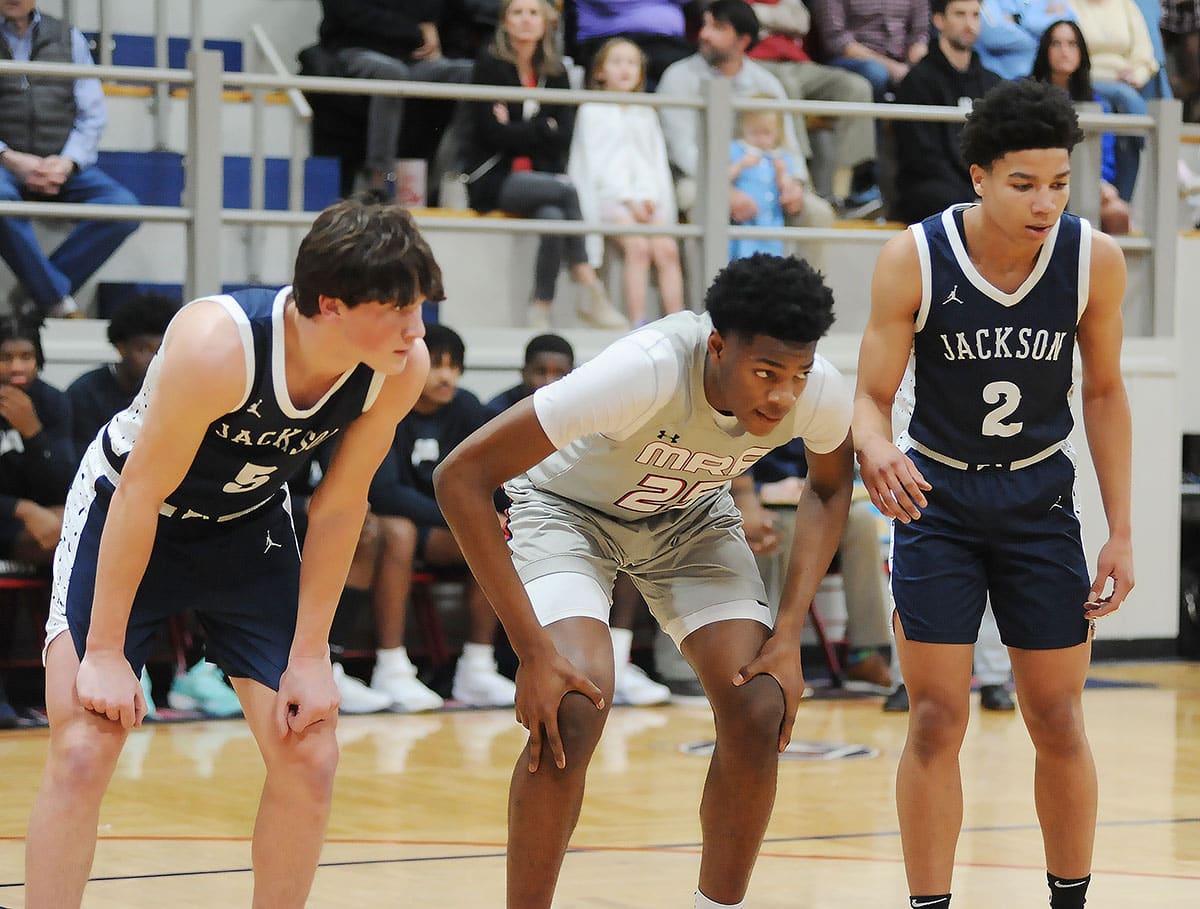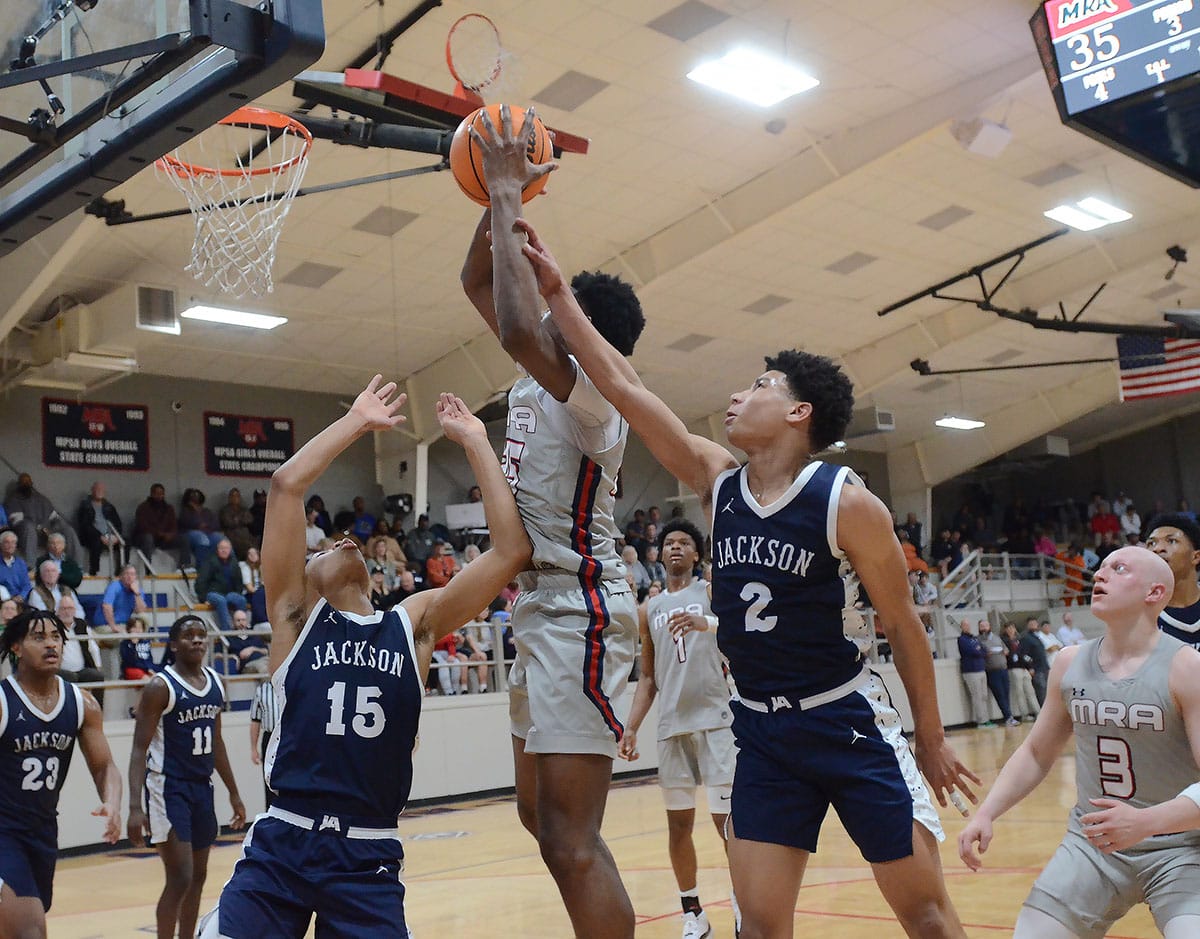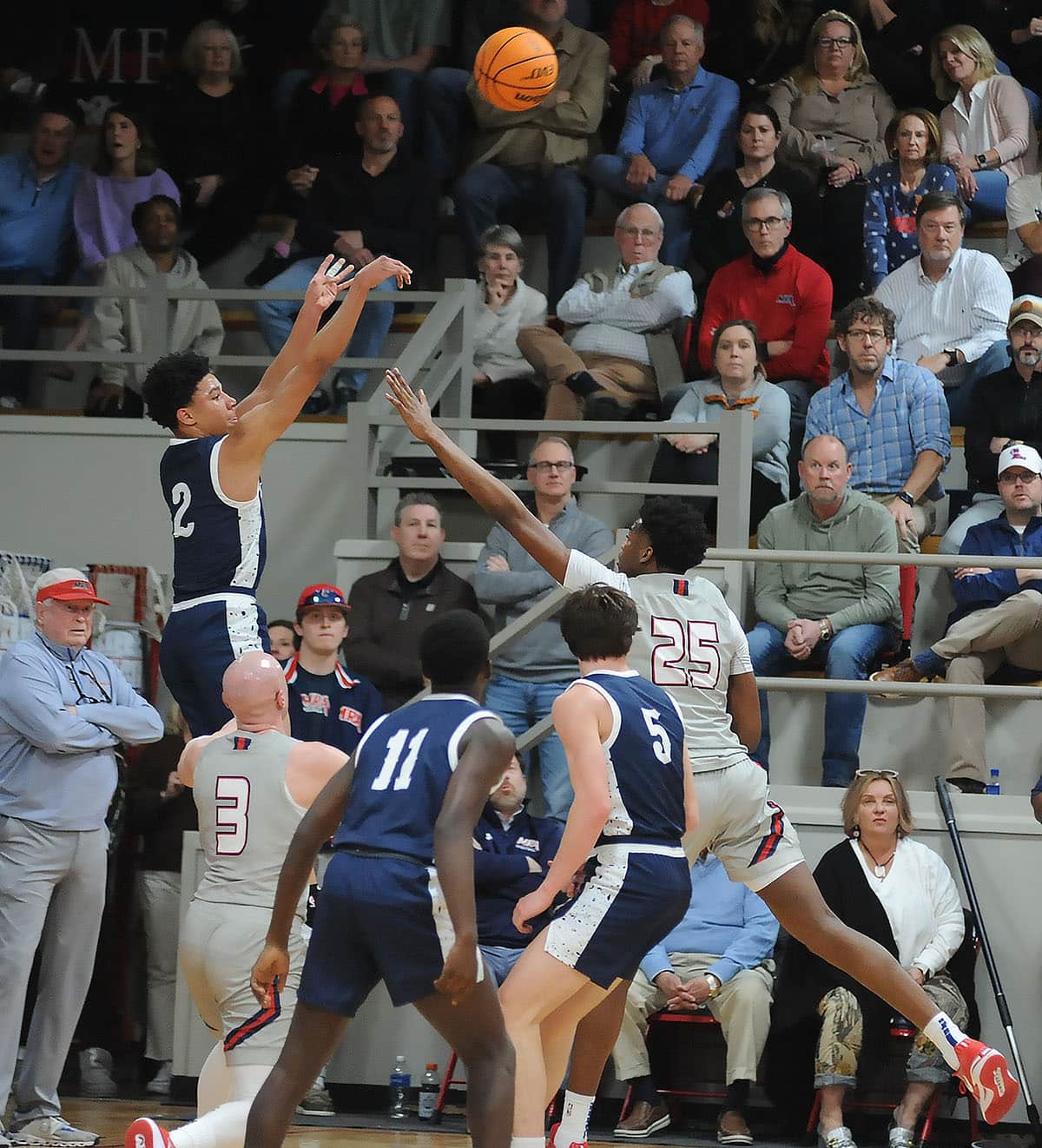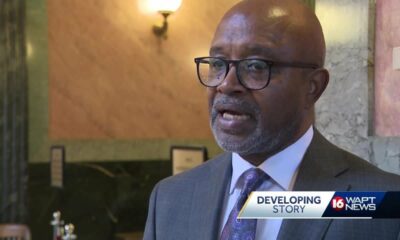Mississippi Today
Don’t look now, but Mississippi private school basketball has drastically improved

Some familiar and storied Mississippi athletic bloodlines were on well-played display at sparkling Duease Hall/Gymnasium on the campus of Madison Ridgeland Academy Thursday night.
The MRA girls team defeated Jackson Academy 46-39 and the Jackson boys returned the favor in the nightcap, dominating the fourth quarter in a 59-45 victory much closer than the final score would indicate.

At one point in the girls game, MRA sophomore point guard Presley Hughes dribbled through the JA defense, drew a double team, and neatly dished a perfect bounce pass to 6-foot, 5-inch sophomore Alyssa Dampier for an easy layup. Dampier, the long-limbed daughter of 16-year NBA veteran Erick Dampier, didn't have to reach far to lay it in. Hughes is the daughter of Whit Hughes, Erick Dampier's teammate and sixth man on the fabulous 1996 Mississippi State SEC Champion and Final Four team.
There's lots more: In the boys game, Mike and Mason Williams, sons of the great NBA star Mo Williams, combined for 40 points, 25 rebounds and seven assists to lead the JA boys to their 28th victory against one defeat this season. Like father, like sons. Mo, now Jackson State's head coach, averaged 13 points and five assists over a 15-year NBA career. Mike, a junior, scored 29 points, many on assists from Mason, a sophomore, who scored 11. Both are highly skilled, tremendously athletic youngsters who look and play a whole lot like their daddy. That's a good thing, especially for second-year JA head coach Jesse Taylor.
And that's not all. The most amazing part of the evening was watching 13-year-old eighth grader Erick Dampier Jr. who scored 18 points, grabbed nine rebounds and blocked three shots in a losing cause for MRA, where his famous father serves as an assistant coach. Yes, Erick Jr. is 13 years young. Yes, he's in the eighth grade (straight A student), playing on the varsity team against guys anywhere from three to five years older. Did I mention he is 6 feet, 9 inches tall and growing like a springtime Mississippi weed?
Says MRA boys coach Richard Duease, the second winningest high school hoops coach in America and namesake of the gymnasium: “Erick was the top-ranked seventh grader in the entire country last year. He'll be the top-ranked eighth grader this year. You ought to see him when he plays against kids his age. It's not fair.”
You can look for much more in the coming days and weeks and years on young Dampier, but there was something else on clear display at MRA on the first day of February 2024, and that's just how much better private school (MAIS) basketball has become in recent years. That's largely because MAIS basketball has become exceedingly more racially integrated.

You can make a good case that two of the best three high school basketball teams in Mississippi are private school teams. JA appears the best. MRA isn't far behind. Pascagoula, which handed JA its only loss this season, is top-ranked by most polls.
“I don't think there's any doubt that MAIS basketball is the best it's ever been,” said Duease, who will enter the Mississippi Sports Hall of Fame this summer. Duease would surely qualify as an expert, his teams having won 33 state championships in his 49-year career in the private schools league. “Obviously, JA is really good, and we're good, but this league is tough everywhere you go. Prep's good, Hartfield is really good. St. Joe is good. There are good teams outside the metro area, as well. There are no easy outs. The entire landscape of high school basketball in Mississippi has changed.”
No question, in games matching public and private schools this season, the latter have won by far more games. That's new. In the recent Rumble in the South at Mississippi College, Jackson Academy blew out Class 7A public school powerhouse Madison Central 80-48, MRA knocked off perennial Class 4A power Raymond 50-48, and Presbyterian Christian of Hattiesburg defeated Provine 60-55.
It's not just in boys basketball either. The MRA girls have defeated Gulfport twice, Hattiesburg and Raymond and own three victories over Memphis city schools.
In the academy league, nearly everywhere you look, Black players are making a huge difference for winning teams. Back when Whit Hughes starred at Jackson Prep in the 1990s, the only time he played against African Americans was in the summer leagues.
MRA got its first Black player in 1995. Duease received a call from Chareck “CC” Cable, who played at Clinton High School but wasn't getting the playing time he desired. He told Duease he'd like to transfer to MRA. Duease talked to both Cable and his mother, explaining that he would need to take an entrance exam and what the costs would be should he make the needed score. Cable, who is now the assistant principal at Clinton Junior High, easily passed the exam, entered MRA and became one of the Patriots' best players.
Nearly three decades later, Cable is back in Clinton as an administrator and remembers that time between his junior and senior years of high school. “I just wanted to play basketball, and if I transferred to another public school I had to sit out a year, which I didn't have,” he says. “It turned out well for me. I was accepted and treated well.”
Duease remembers Cable's first game as an MRA Patriot at East Holmes Academy, which had actually threatened a couple years before to cancel a football game because a rival had welcomed a Black player.
“We were playing at East Holmes and I told our players on our first possession I wanted to set up a for a backside screen for C.C., and I wanted him to tear that rim down,” Duease said, chuckling at the memory. “Well, he darn near did tear it down. Got everybody's attention. I think he dunked it five times in that one game.”
The integration of athletics in the private schools league, spotty at first, has become exceedingly more common in recent years. The result is a much higher level of play, from mostly below the rim to now often high above it.
This article first appeared on Mississippi Today and is republished here under a Creative Commons license.
Mississippi Today
Supreme Court ruling sidesteps issue of spending public money on private schools
The Mississippi Supreme Court in a 7-2 ruling found that Parents for Public Schools does not have legal standing to challenge the constitutionality of the state Legislature sending public money to private schools.
The opinion, released Thursday, did not address the issue of whether the $10 million appropriation made in 2022 by the Legislature to private schools was constitutional.
Justice Robert Chamberlin of Southaven, writing for the majority, concluded Parents for Public Schools did not have standing to bring the lawsuit, in part, because harm to the public schools could not be proven.
Chamberlin wrote that the public education advocacy group says the legislative appropriation “will adversely affect the funding of public schools by legislating a competitive advantage to the independent schools who will receive the funds. This alleged future harm, however, is speculative and not sufficient to meet even Mississippi's permissive standing requirements.”
Coloring the ruling of the majority at least in part, is that the funds appropriated to the private schools were federal COVID-19 relief funds and not state money.
The office of state Attorney General Lynn Fitch had argued that the case should be dismissed because of lack of standing. Fitch's office did not immediately respond to a request for comment about the court's ruling.
Will Bardwell, an attorney for Parents for Public Schools, told Mississippi Today that the Thursday ruling was “outrageous” because the organization he represents had a “direct interest” in ensuring Mississippi's public schools were not undermined.
“This is not how courts are supposed to operate,” Bardwell said. “This is not how courts are supposed to work. When lawmakers ignore the constitution, courts are supposed to stand in their way. Other than Justice Leslie king and Justice Jim Kitchens, seven members of the Mississippi Supreme Court didn't do that today. And that's sad.”
The lawsuit revolved around Section 208 of the Mississippi Constitution, which declares simply that no public funds shall go to any school “that at the time of receiving such funds is not conducted as a free public school.”
During oral arguments before the Court in February, attorneys for Parents for Public Schools contended that it made no difference whether the funds were state or federal funds, only that they were public funds.
Parents for Public Schools argued that it was a group composed of parents of public school children so it should have standing to pursue the lawsuit.
Hinds County Chancellor Crystal Wise Martin agreed with that argument, but the state's highest court overturned her ruling.
Chamberlin wrote that because the funds were federal, “state taxpayer standing
is untenable under the facts of this case.”
Justice Leslie King of Greenville argued that Parents for Public Schools did have standing. King, who was joined in his opinion by Justice James Kitchens of Crystal Springs, questioned whether anyone would have standing to file a lawsuit under the majority's opinion.
King wrote, “The majority's holding today flies in the face of our longstanding liberal standing jurisprudence and severely limits the ability of Mississippi citizens to challenge government actions that violate the constitution.”
Mississippi Today's Taylor Vance contributed to this report.
This article first appeared on Mississippi Today and is republished here under a Creative Commons license.
Mississippi Today
IVF heir bill heads to governor’s desk
A bill to correct an outdated law barring in vitro fertilization children from next of kin inheritance passed both chambers Wednesday afternoon and now heads to the governor to be signed into law.
This is the fifth year Rep. Dana McLean, R-Columbus, filed the measure to give inheritance rights to children conceived via IVF after the death of one parent, as 27 other states have done. These bills died in the legislative process the last four years.
“What a relief … I am just so thrilled that after all this time we came to an agreement that will soon be law,” McLean said. “This will help countless families and children have the right to be able to receive these benefits as they should.”
McLean's legislation was inspired by the personal story of one of her constituents, Katie Studdard, whose 5-year-old daughter has been denied Social Security benefits from her late biological father since birth.
“And that's how a lot of bills that we end up sponsoring come to us – from stories, from an issue someone is having where we need to make adjustments to state law,” McLean said.

Studdard, who lives in Columbus, started fertility treatments with her late husband, Chris McDill, before he died of cancer. She did not have success with the embryos while her husband was alive, but decided to continue trying for a baby after her husband's death. She conceived her daughter Elyse a year after her husband died.
House Bill 1542 passed the House unanimously in mid-March and overwhelmingly passed the Senate in mid-April at the eleventh hour. But the Senate passed it with a reverse repealer, referring it to conference in the hopes of expanding the bill beyond its original scope to protect in vitro fertilization and other forms of assisted reproduction, in the wake of recent events calling fertility treatments into question in Alabama.
Ultimately, that was too big a task to take on at the end of the session, with pro-life groups coming out publicly to express concern about new language they didn't have time to vet, explained Sen. Joey Fillingane, R-Sumrall. Fillingane was one of the lawmakers tasked with debating the details of the bill in conference.
House and Senate conferees reverted the bill back mostly to its original language and were able to achieve the primary goal of securing inheritance rights for posthumously-conceived children with the final version. In addition to that goal, Fillingane said, conferees were able to come up with a definition for “alternative reproduction,” which didn't previously exist in Mississippi.
“I think Chairman (Brice) Wiggins and Chairman (Joey) Hood (of the Judiciary A committee where the bill was assigned) thought … ‘let's get this issue addressed for this family in Columbus that has waited (five) years … and let's at least get a definition in place sort of as a starting point to build a framework out hopefully over the next sessions to add to protect the IVF procedures and processes and surrogacy,'” said Fillingane.

Fillingane had two of his own children through surrogacy, but traveled to California to do so – because the state has clear statutory guidelines around parental rights in surrogacy cases.
“I did not feel comfortable having my kids in Mississippi … there were absolutely no protections that the state of Mississippi offers for parents who have children this way. As a family lawyer, I was uniquely situated to see some of these things,” he said.
Senate Judiciary A Chairman Brice Wiggins, R-Pascagoula, who was instrumental in getting the bill to the finish line, wasn't available for comment.
Although it's been a trying few years, Studdard said she has a newfound appreciation for the Legislature. As a teacher, she has live streamed floor debates during her lunch period at school, has become acquainted with the legislative language of various iterations of the bill, and talked extensively with lawmakers. She says that every time she hears a new legislative word that she doesn't know, she googles it.
“I've learned a lot,” she said. “I think anybody going through any life-changing event, like I did with (my husband's) cancer, and then IVF, and now this bill …you gain a whole new appreciation and so much knowledge you never thought you'd know.”
Studdard is overjoyed that the Senate proposed naming the law after her late husband, Chris McDill, and is proud to model for her daughter and her students that it is possible for an everyday person to enact policy change.
Primarily, she hopes the benefits her daughter will start receiving next year will go toward her future education.
“I just think this financially will create so much security for her and her education, that's number one for me,” Studdard said. “I want her to not have to worry about taking out a student loan. I want her to have a good financial start to life when she goes to college. To be able to hand that to your child is a gift.”
When McLean first authored a bill to address Studdard's predicament, it was the first year of her first four-year term. Now, it's the first year of her second term, and she says it feels full circle.
“When (Studdard) first told me about her little girl and being a single mom, at that time Elyse was just a baby, and it really hit home to me because I am also a single mother of a daughter, and I understood the significance of this and how we really need to protect children and women and mothers and families,” McLean reflected. “I felt like it was really something I could get behind.”
This article first appeared on Mississippi Today and is republished here under a Creative Commons license.
Mississippi Today
Belhaven man’s widow will decide what will be done with his remains, but independent autopsy will be done
A Hinds County chancery judge has removed the brother of Dau Mabil from a lawsuit filed against the man's widow that would have allowed him to gain access to his brother's body for an independent autopsy.
Judge Dewayne Thomas issued two orders Thursday morning several days after a hearing in a lawsuit between Bul Mabil and Karissa Bowley, along with state investigators, about what will happen to Dau Mabil's remains.
In the hearing and court filings, Bowley said she will allow an independent autopsy to be conducted.
“I do feel relief that this part of things is over and we can move on to what we were doing before, which is continue to dig for information,” she said Thursday after the judge's orders were released.
On March 25, the 33-year-old Belhaven resident went on a walk in his usual area without his phone. He was seen on video surveillance on Jefferson Street between Fortification and High Street, and at one point went to the Museum Trail in Belhaven Heights to check on corn he planted.
About three weeks later, a fisherman spotted a body floating in the Pearl River near Lawrence County, more than 50 miles away. By April 18, a preliminary autopsy revealed the body belonged to Mabil. The Lawrence County sheriff said there was no evidence of foul play.
In his order, Thomas imposed safeguards proposed by Bowley and the Department of Public Safety for the independent autopsy: It needs to be conducted after the state finishes its investigation and be conducted by someone who is a qualified pathologist with a certain medical degree and certification.
After the state finishes its investigation, official autopsy results shall be released only with consent of Bowley, as the surviving spouse and next of kin, according to the court order.
Bowley is awaiting the report from the first autopsy to shed more light on what happened and whether anyone from the public knows anything or has any video from the day Mabil disappeared, including video Bul Mabil's attorney mentioned that supposedly shows people at the Museum Trail moving that appears to be a body into a truck around the time Mabil was at there.
The Department of Public Safety will hold Mabil's remains for 30 days after the state finishes its death investigation so the independent autopsy can be done.
Bul Mabil filed the lawsuit the night before his brother's body was identified because he believes it is the only way to know whether there was foul play in his brother's death. U.S. Rep. Bennie Thompson has asked the Justice Department to investigate.
In a separate order, Thomas agreed that Bowley, as Mabil's surviving spouse, is Mabil's next of kin and the one who can direct what happens with his remains.
He dismissed Bul Mabil as a plaintiff because he lacked standing in the matter.
At a Tuesday hearing, his attorney, Lisa Ross, argued that he should be Dau Mabil's next of kin because his brother and Bowley had a strained relationship leading up to his disappearance. Ross said Mississippi has no existing case law that defines who is a surviving spouse, but referenced a New York case in which a wife separated from her husband was not allowed to cremate his body and interfere with the mother's request for an autopsy.
He has also argued in court records that he should remain in the case because he is the next of kin for Dau's child.
Ross could not be reached about whether she plans to appeal.
The lawsuit has been renamed to reflect the new parties: Bowley v. Mississippi Department of Public Safety.
Now that the judge has written the orders, Bowley said she feels relieved and has more freedom to grieve her husband, including visiting places around the city where they went together.
One of those is the patch along the Museum Trail where Mabil planted corn. Bowley said she's returned there to water the plants and see them grow.
“It's a nice place to be reminded of him along with many others,” she said.
This article first appeared on Mississippi Today and is republished here under a Creative Commons license.
-
Mississippi Today5 days ago
On this day in 1951
-
Mississippi News5 days ago
One injured in Mississippi officer-involved shooting after chase
-
SuperTalk FM3 days ago
Festival merger in Leland sets up one major event for Mississippi Delta
-
Mississippi Business2 days ago
Geartek expanding operations in Alcorn County
-
Mississippi News2 days ago
Two women accused of shoplifting across southeast captured in Mississippi
-
SuperTalk FM3 days ago
PERS bill set to phase in employer rate increase heads to governor’s desk
-
SuperTalk FM6 days ago
Investigation underway after gun found in backpack of Ridgeland High School student
-
SuperTalk FM6 days ago
Mississippi Senate throws curveball, sets spiral in motion for brand new public school funding formula










































